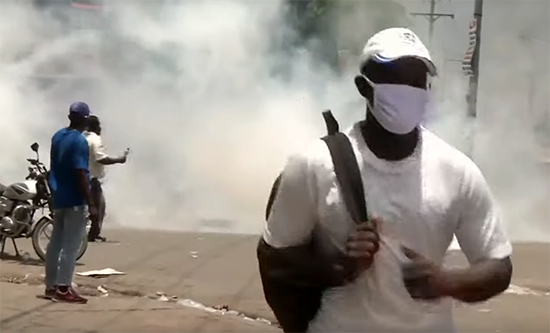
Haiti’s decades-long domination by US imperialism has left it defenceless in the event of a widespread Covid-19 outbreak. At time of writing, official figures suggest that 234 Haitians have been infected with Covid-19 and 18 have died. These low figures, however, are unlikely to reflect reality, as the Ministry of Health has said that fewer than 500 people have been tested for the virus so far, and almost no testing has been carried out in rural areas. The potential for a wholesale disaster is very real. Jacob Dexter reports.
Lives at risk
According to the World Bank over 70% of Haiti’s urban population live in densely packed slums. This makes social distancing impossible. Clean water – essential for fighting the virus – is often hard to come by. The government has started handing out food aid but the distribution has been sporadic and the deliveries too small. Once Haiti saw the first cases of Covid-19 schools, factories and places of worship were closed. Borders were shut and a curfew was introduced. These restrictions, however, do little for the huge number of working class Haitians who are informally employed, meaning that they rely on odd jobs and cash-in-hand wages. When the only alternative is starvation these people have been continuing to work and potentially spreading the virus. The government has no plans so far to provide assistance so that informally employed people can self-isolate.
Textiles make up 90% of the country’s exports. The factories are owned by local or foreign manufacturing concerns that are contracted to supply US companies like Levi’s and Walmart with cheap clothing. Wages and working conditions are abysmal, meaning that the clothes can be manufactured inexpensively and then sold at a marked-up price once they reach the US. In mid-April the Haitian government announced that it would be re-opening the textile factories after just over a month of lockdown. This flies in the face of the official advice of international bodies like the Pan American Health Organisation, which has said that restrictions should remain in place until the infection rate is more comprehensively understood.
The government simultaneously demanded that citizens wear masks whilst out in public. A state-funded programme to produce the masks in textile factories has yet to meet its target of 10 million units, and those that have been produced have yet to be distributed to citizens, which led Prime Minister Joseph Jouthe to say “Wear masks, wear masks… I don’t care what they are made of”. Jouthe was appointed Prime Minister by President Jovenel Moïse in March when a series of delayed elections meant that Moïse could rule by decree and install a loyal unelected parliament. Haitian capitalism is desperate to restart production even if that means placing hundreds of thousands of lives at risk.
Healthcare
Haitian healthcare is woefully unprepared for an outbreak of Covid-19. The Grayzone (30 March) reports one estimate that without a significant effort from the Haitian government and large scale foreign investment, as many as 800,000 Haitians could die of Covid-19: more than double the people who died during the 2010 earthquake (See FRFI 213). Personal protective equipment (PPE) is severely lacking, leading to some doctors and nurses refusing to go to work. According to estimates there are fewer than 30 functioning ICU beds and 64 ventilators in the entire country of over 11m people. Neighbouring Cuba has nearly 2000 ICU beds for a similarly sized population.
Over the last eight years, the state has slashed health spending from $9.48 per capita in 2012 to just $0.60 today (4.4% of the budget). A majority of this money, as with most state expenditure in Haiti, comes from foreign assistance and investments. This reliance on foreign financing is rooted in the domination of the country by imperialism, which has consistently attacked every attempt made by Haiti to break free of its grip and develop its own insitutions.
In 2004, a US-backed coup d’etat ousted president Jean-Bertrand Aristide. Aristide had been working with Cuba to improve Haiti’s healthcare system, and he repeatedly refused to give in to demands by the International Monetary Fund to impose austerity on the Haitian people (see FRFI 178). Since his removal, successive Haitian governments have loyally facilitated the imperialist plunder of the country.
Imperialism is bad for your health
Haiti is no stranger to public health disasters imposed on the country by imperialism. 2010’s magnitude 7.0 earthquake was followed by Haiti’s first outbreak of cholera in over a century. 800,000 people were infected and around 10,000 died. The disease was brought into the country by UN so-called ‘peacekeepers’ stationed in Haiti to police the population in the aftermath of the earthquake. The armed ‘peacekeepers’ likely caused the outbreak by dumping human waste into a tributary stream of the Artibonite river from which locals drew their drinking water. Lack of access to sanitation, lack of medicine and a decimated healthcare system – all imposed on Haiti by its continued domination by imperialism – all contributed to the death toll from the cholera outbreak. They will contribute to another enormous death toll if Covid-19 spreads further in Haiti.
The depredations of imperialism could not stand in greater contrast with the long tradition of solidarity extended to Haiti by socialist Cuba. In March Cuba dispatched a brigade of 348 doctors, nurses and other health specialists to help bolster Haiti’s healthcare system. Cuba has also shipped PPE, including tens of thousands of masks. The lesson for the working class and oppressed people of Haiti and the world is clear. While imperialism happily sacrifices the working class and oppressed of Haiti and the world, whom it condemns daily to poverty, underdevelopment and brutality, socialist Cuba extends the helping hand of solidarity.




